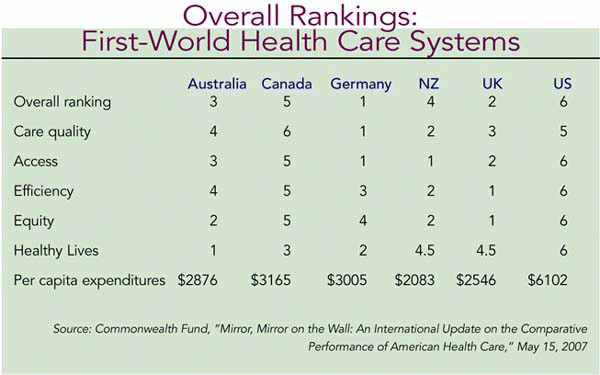Executives, royalty, and even the indigent seeking the world’s best, most advanced medical care find it in the United States. Yet many of the positive aspects of our health care system, including our number-one rating on patient satisfaction by the World Health Organization and our superlative technological innovations, often fall by the wayside because of one glaring deficiency-14.6% of the US population is uninsured. (Never mind that the Federation on American Immigration Reform found that 25 percent of the uninsured are illegal aliens and that they account for 59 percent of the annual growth of the uninsured population.)
Explore This Issue
September 2007Our system often gets a black eye on comparative rankings with other first-world countries because we lack universal access to care. But since few have bothered to compare our track record on the 85.4% of our insured population with similar populations in other developed countries, we continue to rank poorly. The prominent physicians ENToday talked to about the results certainly did.
Comparing the US health care system with those in Canada, Germany, the UK, New Zealand, and Australia, the Commonwealth Fund’s report, Mirror, Mirror on the Wall: An International Update on the Comparative Performance of American Health Care, ranked the American system last (see table below). Karen Davis, PhD, President of the Commonwealth Fund, said: Our failure to ensure health insurance for all and encourage stable, long-term ties between physicians and patients shows in our poor performance… In light of the significant resources we devote to health care in this country, we should expect the best, highest performing health system.
The Commonwealth Fund’s basic argument is that the US health system, the world’s most expensive, globally underperforms because the United States lacks universal health insurance coverage. Other nations, in contrast, ensure the accessibility of care through universal health insurance systems.
The Commonwealth Fund’s findings may disturb some system stakeholders, but many prominent physicians and consultants say otherwise. ENToday plumbed some of the experts in its network to get their reactions to the United States’ ranking on the Commonwealth Fund’s findings. The responses were forceful, disparate, and interesting.
Greensboro, NC-based Steven Feldman, MD, PhD, Professor of Dermatology, Pathology and Public Health Sciences at Wake Forest University School of Medicine and founder of Dr.Score.com , a web site where patients rate their doctors, said: Dead last? I’d like to respectfully disagree with that. While there is certainly a big problem with care for the uninsured in the US, once you get to see a doctor there’s no better place in the world to be. Patients largely love their doctors. According to Dr.Score.com , nearly all patients give their doctors ratings of 9 out of a possible 10. Otolaryngologists, in particular, were among the highest rated specialties.

Leave a Reply